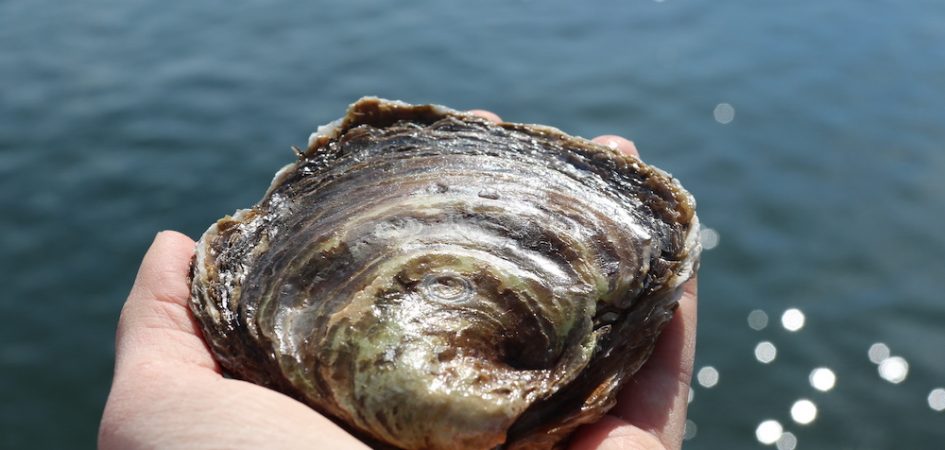
Published on: 13 May 2021

The Wild Oysters Project continues restoration efforts with the placement of ‘ocean superheroes’ under marina pontoons in Scotland.
1,300 native oysters have been returned to waters in the Firth of Clyde, as part of an ambitious restoration project to bring back these ‘ocean superheroes’ from the brink of extinction.
The Wild Oysters Project, a partnership between Zoological Society of London (ZSL), Blue Marine Foundation (BLUE) and British Marine aims to help restore healthy, resilient coastal waters around the UK.
The Wild Oysters Project, a three-year ambition, was awarded £1.18m by the Postcode Dream Trust. The Dream Fund, run by Postcode Dream Trust, gives organisations the opportunity to bring ambitious, innovative and collaborative projects to life.
Earning themselves the title ‘ocean superheroes’, native oysters (Ostrea edulis) provide great benefits to the health of the ocean, including filtering pollutants from our seas and acting as an important habitat for marine wildlife. Declining by 95% due to human activities, native oyster populations have continued to decrease since the 1800s, meaning their benefits to the ocean have been lost.
In a bid to restore native oyster populations, and in turn see the return of healthy coastal waters, nurseries filled with oysters will be suspended underneath marina pontoons in Largs Yacht Haven and Fairlie Quay Marina. The nurseries create a microhabitat where the oysters can reproduce, much like a maternity ward to the next generation of oysters. These oysters will begin reproducing over the next few months, releasing millions of baby oysters, known as larvae, into the ocean.
Celine Gamble, Wild Oysters Project Manager, ZSL, said; “The Firth of Clyde is an important area for marine life and with just a handful of known oyster populations remaining across the 4000km2 sea area of The Clyde, we have an exciting opportunity to contribute to the restoration of local native oyster populations here in the West of Scotland. Thanks to players of the People’s Postcode Lottery, we can work to restore the native oyster population to support healthy, resilient, coastal waters in west Scotland.”
“Now the oysters are in their new home in the marinas, they will almost immediately begin their important work each filtering 200 litres of water a day. In the coming months, the oysters will start to produce the next generation of the oyster population, by releasing larvae which will then settle onto the seabed. It’s our ambition that the project will help to create cleaner water, healthier fisheries and plentiful marine biodiversity in Britain.”
The project has partnered locally with the Clyde Porpoise Community Interest Company (CIC) and local working group Fairlie Coastal Trust, and a local project officer will help to monitor and care for the newly placed oysters as part of The Wild Oysters Project.
The Wild Oysters Project Local Project Officer and Clyde porpoise CIC Founder, David Nairn, said; “Inshore dredging, pollution, climate change and illegal shellfish harvesting have all contributed to the demise of the native oyster population here in the Firth of Clyde. Restoring this incredible species under marina pontoons will enable us to support healthy coastal waters in the Clyde and across Scotland, while also providing an outdoor classroom for local schools and communities, creating a ‘window’ into the ocean to inspire the next generation to protect and care for the marine environment.”
The Wild Oysters Project have deployed a total of 4,000 native oysters into nurseries, underneath marina pontoons across the Firth of Clyde in Scotland, Tyne and Wear in NE England and Conwy Bay in Wales.
Laura Chow, Head of Charities at People’s Postcode Lottery, said: “The release of the project’s native oysters into Largs Yacht Haven and Fairlie Quay Marina is a huge milestone, all possible thanks to the support of players of People’s Postcode Lottery. Oysters are an important part of our ecosystem and The Wild Oysters project will not only support our oceans but help educate and share the importance of these ocean superheroes with thousands of volunteers, school and university students, and local community groups.”
British Marine Environment Executive, James Scott-Anderson, said; “British marinas are once again enabling the recovery of oysters. Largs Yacht Haven is one of the largest in the UK with over 700 berths, and Fairlie Quay is a fully commercial operation, and are ideal for the deployment of the oyster nurseries with exceptionally clean waters. Both venues are a great example of how large and busy facilities can host environmental projects, proving how industry, science and sustainability can work together successfully.”
BLUE’s Restoration Project Manager, Jacob Kean Hammerson, said; “It is vital in the current climate emergency and biodiversity crisis that nature receives the help it needs to bounce back. This is especially relevant in Scotland, just months after the Government published their decadal assessment of the marine environment showing that Scotland failed to meet a ten-year-old target to prevent damage to “priority” marine habitats. The Wild Oysters Project will give the marine environment a chance to recover.”
For more information visit here.



